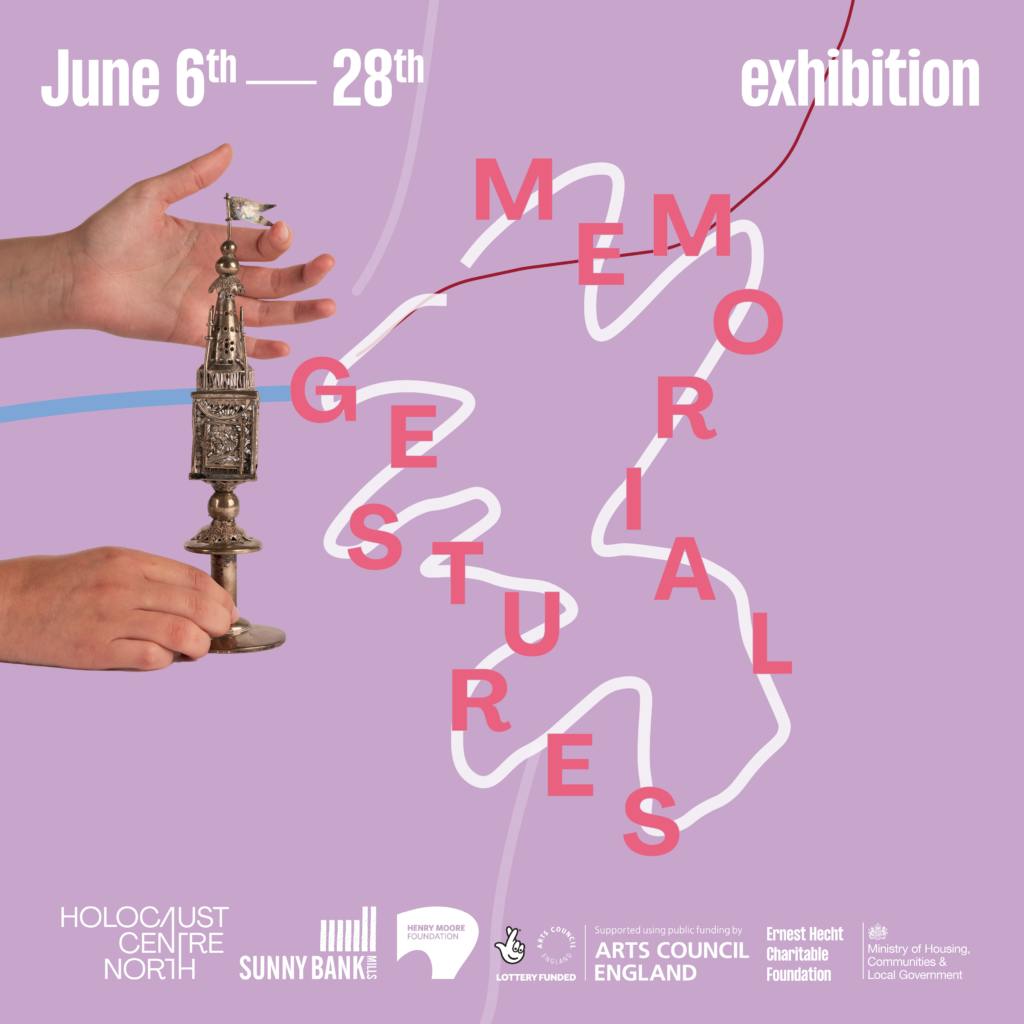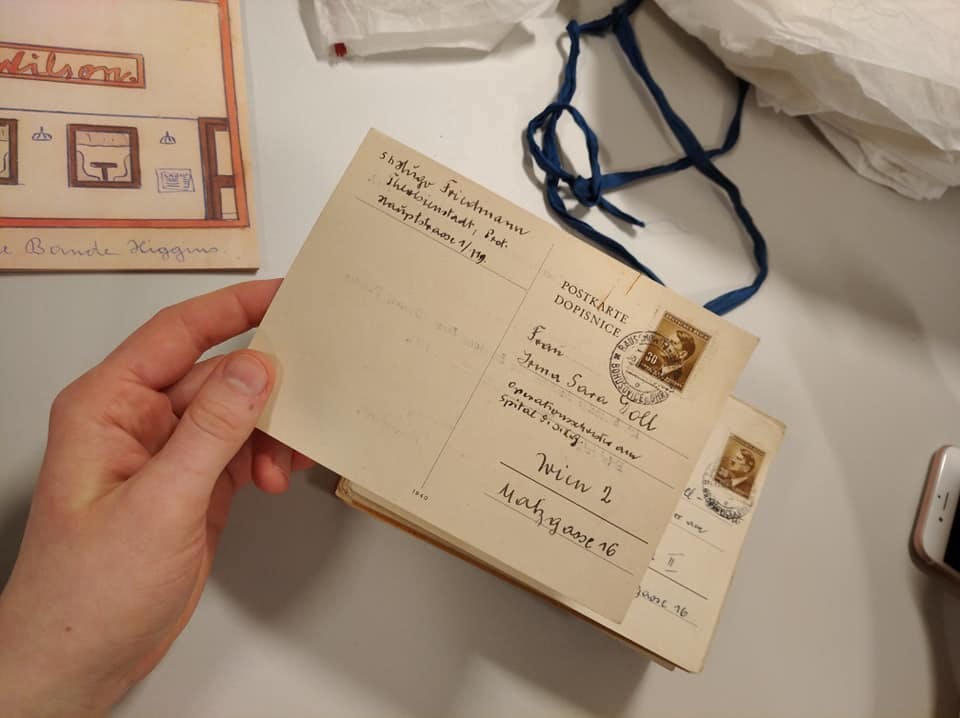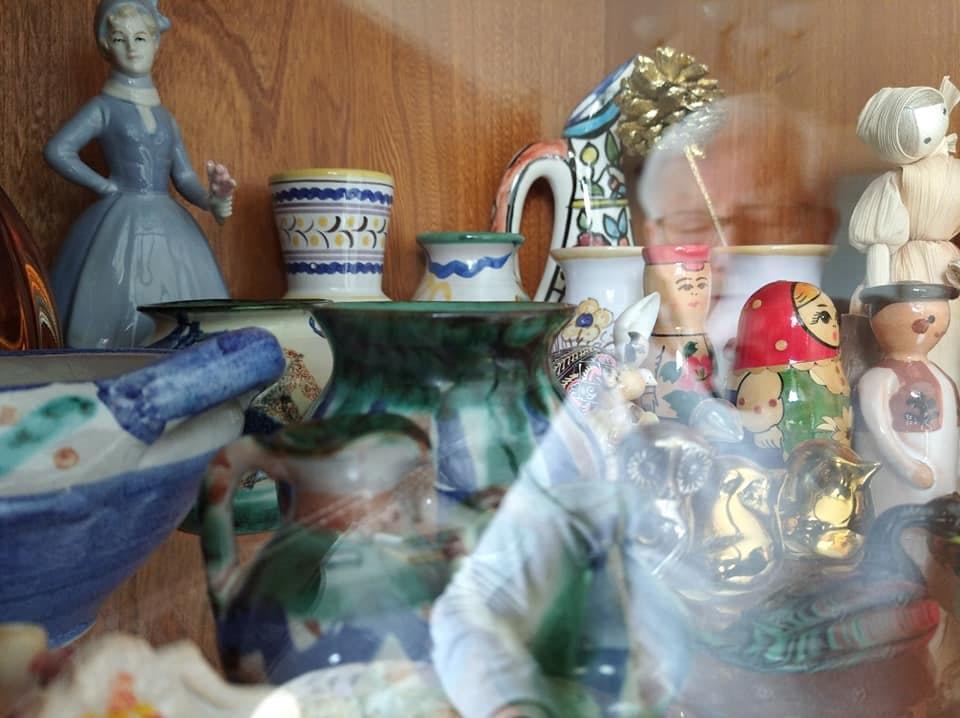Artistic Responses to Collections
At Holocaust Centre North, we work with artists to bring to life the lesser-known stories in our archive, in ways that are meaningful to people today. Our aim is to connect past, present, and future in order to inspire creative action to help shape a better future, and remove barriers to access art and heritage.
Memorial Gestures – Exhibition at Sunny Bank Mills
This public exhibition ran from June 6th – 28th, 2025.
How do we continue to remember the Holocaust with depth and relevance? And to what end?

Stories of migration, trauma, loss, hope, resilience and survival, explored through artworks created by 14 artists, writers, and translators in residence.
Jordan Baseman, Rey Conquer, Laura Fisher, Tom Hastings, Maud Haya-Baviera, Sierra Kaag, April Forrest Lin 林森, Hannah Machover, Laura Nathan, Nathalie Olah, Irina Razumovskaya, Chebo Roitter Pavez, Matt J Smith and Ariane Schick responded to collections held in the Holocaust Centre North Archive with works spanning textiles, video, installation, photography, drawing, etching, ceramics, print, found objects, and text.
Their artworks delved into the complex emotional and ethical dimensions of Holocaust history and remembrance—through colour, sound, texture, composition, repetition, and gesture—in ways that words or data alone cannot. In mediating stories from the Holocaust Centre North Archive, the Memorial Gestures artists explored how to evoke the layered emotional realities found in personal accounts of mass atrocity and trauma—aware that memorialisation can sometimes displace as much memory as it preserves.
In course of their residencies at Holocaust Centre North, spanning between 6 and 9 months, each artist responded to archive material they felt held contemporary relevance. The resulting works reflected critical, intimate and animated dialogues between their own diverse life experiences and Holocaust history.
Through their works, the artists engaged with the experiences of Jewish mill workers in Yorkshire (including at Kagan Textile Works), the intergenerational trauma of children of Holocaust survivors, marginalised Roma and LGBTQ+ stories, letters of families desperately seeking safety abroad and the final telegrams between loved ones.
By giving physical form to archive material, these works invited audiences into a dialogue with history—one that resonates powerfully amid a global rise in authoritarianism, antisemitism, ethnic and religious conflict, and mass displacement.
As well as visual art, the works of resident writers and translators also formed part of the exhibition. Tom Hastings, Rey Conquer, Sierra Kaag and Nathalie Olah were commissioned by Holocaust Centre North to share works-in-progress from their forthcoming book-length projects.
Memorial Gestures compels us to engage, even when it might be easier to look away. We hope that by doing so, we can build a culture of care towards stories of trauma, foster greater resilience against a contemporary politics of dehumanisation and create space for a culture of solidarity. This harkens back to the very aim motivating Holocaust survivors to come together in the mid 1990’s to form the organisation and community that would grow into Holocaust Centre North.
Memorial Gestures ran from Friday 6th to Saturday 28th June 2025 at The 1912 Mill, Sunny Bank Mills, Farsley, Pudsey, West Yorkshire.
Throughout the exhibition, we hosted public and private events, talks, and tours designed to engage diverse communities with contemporary art and narratives of migration, persecution, resilience, and survival.
Curated by Holocaust Centre North’s Paula Kolar, Memorial Gestures has been generously supported by The Ernest Hecht Charitable Foundation, Arts Council England, The Ministry of Housing, Communities and Local Government, and the Henry Moore Foundation.
Encountering Survival: An Audioguide by Louise K Wilson and Linda O Keeffe
Louise K Wilson and Linda O Keeffe have worked with the Holocaust Centre North Archive and survivor community to develop a set of audio guides for our exhibition. Both artists have a history of working with archives or survivors of traumatic histories through sound. Louise K Wilson and Linda O Keeffe have each produced 5 tracks for Encountering Survival, focusing on ‘objects’ and ‘voices’ respectively.
Working alongside each other they reflect on the intangible, which is often difficult to archive and, therefore, often lost in history. They have also produced an intimate record which bears witness to the act of remembering itself. Artist Aous Hamoud, has produced visual responses to each track which are embedded in the browser-based app developed by Nikita Gaidakov.
We are happy to provide you with headphones, if you would like to listen when you visit our centre.
Or click the link below to listen wherever you are via our browser-based app.
Postmemory: Ben Spatz
As part of the Festival Cultures of Place, we exhibited Ben Spatz’ work Postmemory in the North from June to August 2022, which marked the beginning of the Holocaust Centre North’s engagement with Ben Spatz’s and Lindsey Dodd’s research. Ben is a nonbinary scholar-practitioner and a leader in the development of new artistic and embodied research methods at the University of Huddersfield.
The videos presented in Postmemory in the North are documentation of visits by The Judaica Project to ruined and partially restored Synagogues in Poland. In Ben’s words, his work represents ‘a kind of research on place as well as memory. In these places, we encountered the relics of genocide alongside museum exhibits, archival traces, and objects ranging from the mundane and kitschy to the downright racist.’
Nostalgia Ranch: Daria Martin
Part three of a series, Nostalgia Ranch, 2021 (anamorphic HD, 8 min), concludes Daria Martin’s work on her the dream diaries of her grandmother Susi Stiassni whose family fled Brno, Czechoslovakia, in 1938, in response to the looming threat of Nazi occupation. The production of this work was accompanied by a series of workshops on Social Dreaming, facilitated by the Holocaust Centre North and with the participation of members of the third generation in Canada, Australia and the UK.
A Wounded Landscape: Marc Wilson
Over the course of six years, Marc Wilson visited over 160 locations throughout Europe, documenting sites that bore witness to acts of genocide during the Holocaust. He writes: ‘These sites persist today throughout these countries. […] They are connected by the landscapes that surround them, and the forced journeys made between them. At these sites, individual killings and slaughter on a mass scale took place, the numbers involved almost beyond our understanding. These are sites where literal life or death decisions were made, but they are also sites of hope, survival and memory.’
A creative learning session based on Marc’s work is part of our current school learning programme.
[In a way]: Paula Kolar
In 2018, Tracy Craggs recorded several interviews with camp and death march survivor Iby Knill, her children, and grandchildren. Each interview is a dialogue between Iby and one of her family members, carefully guided by Tracy’s questions. The space created and captured in these interviews is an intimate one, allowing family members to voice previously unspoken thoughts, questions and experiences.
This zine is a response to these recordings. It is, [in a way] a kind of family portrait – a portrait of a family born in the wake of the Holocaust.
The word ‘resilience’ comes up, but so does the word ‘faith’ – faith in the human potential to do good. Along with this, a strong sense of justice, and a need to take one’s bearing, to understand oneself in relation to something bigger, be that a family, nature or humankind. This work stems from the desire to gain a better understanding of how trauma is passed on through generations, and how the repercussions of the Holocaust stretch into the present, infringing upon the family of survivors more or less existentially.

















